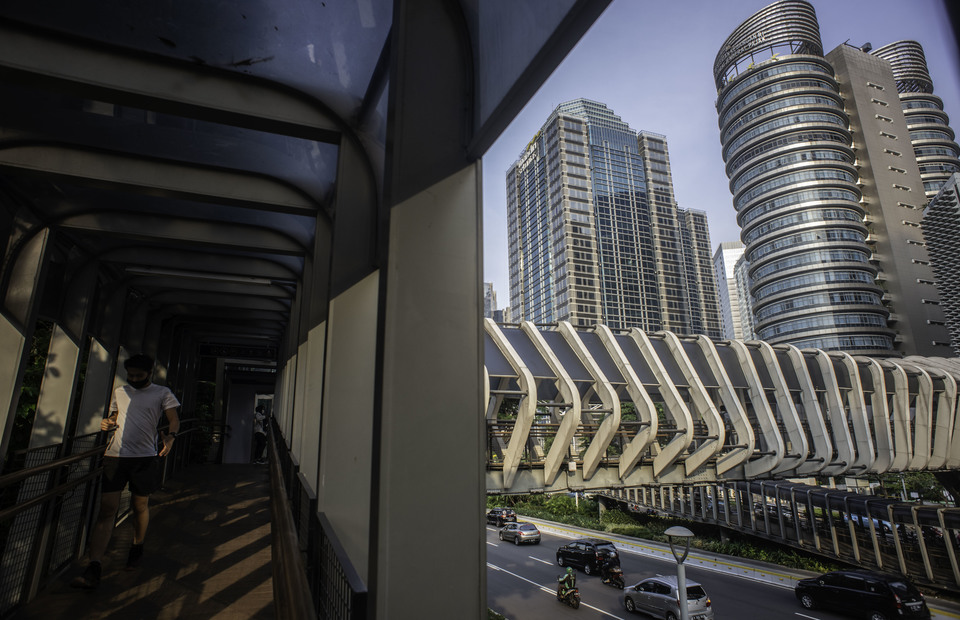JAKARTA -The International Monetary Fund (IMF) has revised on Tuesday its 2021 global economic growth projection upward as a boost from the United States giant fiscal stimulus would propel the global economy while emerging countries like Indonesia underperform.
The IMF World Economic Outlook projected the global economy would recover from its 3.3 percent contraction last year to expand by 6 percent this year, up from its January projection of 5.5 percent. For 2022, IMF projected that the world economy would increase by 4.4 percent compared to the previous projection of 4.2 percent.
For Indonesia, the fund lowered its growth projection to 4.3 percent this year from January’s 4.8 percent but kept the 5.8 percent estimation for next year.
Gita Gopinath, the IMF chief economist, said that the recovery was also driven by adaptation to everyday life in the developed economies and US President Joe Biden’s $1.9-trillion fiscal stimulus.
“The upgrades in global growth for 2021 and 2022 are mainly due to upgrades for advanced economies, particularly to a sizeable upgrade for the United States (1.3 percentage points) that is expected to grow at 6.4 percent this year” Gopinath said.
She also said that the euro area and another developed economy would rebound this year, albeit slower, and Chine would be leading recoveries among the emerging economies.
“While China’s economy had already returned to pre-pandemic GDP in 2020, many other countries are not expected to do so until 2023,” she said.
The IMF saw a tick up by 0.6 percentage points from the previous projection to 8.6 percent for developing countries in Asia. This is thanks to the relaxation of lockdown policies in several countries such as India. However, the number of Covid-19 cases, such as in Indonesia and Malaysia, holds back the prospect of higher growth.
The global recovery would still largely depend on how countries manage to curb the Covid-19 pandemic, Gita said.
“The pandemic is yet to be defeated, and virus cases are accelerating in many countries. Recoveries are also diverging dangerously across and within countries, as economies with slower vaccine rollout, more limited policy support, and more reliance on tourism do less well,” she said.
A Disappointing Q1
The Finance Ministry said in its latest projection last month that Indonesia’s economy would still contract by 1 percent to 0.1 percent in the first quarter this year.
Finance Minister Sri Mulyani Indrawati told the House of Representatives on Monday that economic activities in January and February had yet to recover as the government imposed micro-scale restrictions to curb the Covid-19 spread, which peaked during the months.
Sri Mulyani said she expected the activities should recover in the second quarter this year. The government has set aside Rp 699.4 trillion ($48.2 billion) for economic stimulus programs in the National Economic Recovery (PEN) this year, up from Rp 579.8 trillion last year.
“We hope that we were not only recovering but also able to become stronger and better,” she said.
The minister acknowledged the Covid-19 threat that was still posing a threat to Indonesia’s recovery.
“That’s why in the 2021 state budget, we allocate more than Rp 54 trillion for vaccination,” Sri Mulyani said.
The country has delivered more than 13 million Covid-19 vaccines shot so far to close to nine million of its population, the Health Ministry data showed. That put Indonesia in 8th place globally in terms of total vaccination number, according to data collected by Oxford-based research institution Our World in Data.
Beyond the vaccination, Indonesia had allocated more budget for testing, tracing, and treatment, bringing up the total for Covid-19 handling to Rp 176.3 trillion, Sri Mulyani said.
“That is a huge budget, aimed at providing a kind of assurance or robust support for the health sector to handle Covid-19,” she said.

